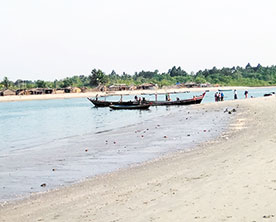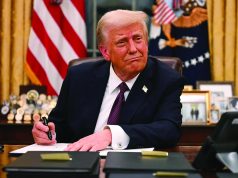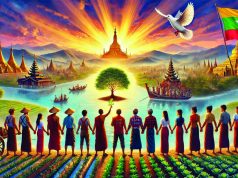With millions of illegals coming in from the Western front and the increasing number of unskilled foreigners working in major cities Myanmar government must take prompt action as they could become serious security issues for the country in the near future.
The pressure from United Nations (UN) is higher than even, since Aung San Su Kyi took over as the de facto Chief of the Nation. The report by the biased UN special rapporteur is being pushed onto the discussion tables of UN Security Council, with the eventual aim of sending UN peacekeepers onto Myanmar soil. Non-interference policy of Association of South East Asian Nations (ASEAN) has also been conveniently ignored, especially by the Muslim dominated Malaysia. Now is the time, more than ever, for the heads of state to take a stand, clearly stating our immigration policy and laying down the foundations for integration of possible future immigrants into Myanmar
We have violence initiated by illegal immigrants from Bangladesh in the western Rakhine state. The military had to step in and take action. As Lee Kuan Yu stated “We sometimes have to lock up people, without trial, whether they are communists, or religious extremists. If you do not do that, the country would be in ruins.”
Exiting Policy
Myanmar Citizenship law of 1982 is used as the current immigration law. According to the law, becoming a citizen of Myanmar is based on bloodlines, rather than your qualifications or investments criteria. As previous Minister for Immigration, HE U Khin Yi stated, the bloodline would last for two generations. As long as one of your grandparents is one of 135 races of Myanmar, you are deemed to have Myanmar bloodline and you are therefore eligible to become a Myanmar citizen, regardless of how Caucasian, Chinese or Indian you look, in your appearance. We do not have Caucasian, Chinese, Indian or Bengali in that list of 135 recognized races of Myanmar.
Obviously the current policy has its own merits and disadvantages. First it encourages integration into Myanmar culture and society. As the famous saying goes, ‘If you are in Rome, behave like a Roman’. If I go and stay in the UK, I cannot be cooking Nga Pi (smelly fish paste) everyday and disturbing my English neighbors with that smell. In Myanmar, the society is perfectly ok with that smell, however. The fact that you can only become Myanmar citizen through bloodlines encourages immigrants to marry locals and integrate into Myanmar society. The policy also allows Myanmar society to preserve its own religion, culture and traditions, without the fear of being overtaken by a dominant religion or ethnic group.
The disadvantage of this policy is similar to what Japan is experiencing now; Myanmar may miss out on foreign talent, wanting to relocate and settle in the country.
The Need for Integration and Why we must Integrate
As Australian Prime Minister Gillard said ‘this is our country, our land, and our lifestyle, and we will allow you every opportunity to enjoy all this. But once you are done complaining, whining, and griping about Our Flag, Our Pledge, Our beliefs, or Our Way of Life, I highly encourage you take advantage of one other great Australian freedom, ‘THE RIGHT TO LEAVE‘.’ ‘If you aren’t happy here then LEAVE. We didn’t force you to come here. You asked to be here. So accept the country you accepted.’
In general, immigrants must integrate into Myanmar society. They cannot stay exclusively within their own groups and be distinct from the rest. Just like any other country, Myanmar will not allow a foreign culture to develop inside the country. E.g., Austria’s foreign and integration minister even called for fines of up to €1,000 (£750) for migrant parents who don’t encourage their children to integrate into Austrian culture and society. Integration means going to local schools, following local laws, culture and traditions, mixing around locals and speaking the local language.
Benefits of integration are well documented across the world. Besides serving national interests, in both peaceful and crisis times, national unity is a force to be reckoned with for potential foreign threats, large or small. Here I must highlight that among the races and religions, it is most difficult to integrate Muslims.
In his book The Hard Truths, Lee Kuan Yu mentioned ‘I think Muslims are distinct and separate. They say, “Are these plates clean?” I said, “ You know, same washing machine.” Halal, nonhalal and so on. They are all divisive. They are distinguishing me from you: I’m a believer, you are not. That’s that. Nobody doubts hygiene. They tend to sit separately. These are the demands of the religion but the consequences are a veil across and it is designed to be so. Islam is exclusive. I would say today, we can integrate all religions and races, except Islam.’
Orthodox Islam was a powerful force capable of recruiting volunteers for terrorist groups. Although Muslims in South East Asia are traditionally moderate and tolerant, they have been affected by radicalism emanating from the Middle East.
Immigration Assessment Criteria
Currently, Myanmar does not have a comprehensive system to allow talented people of different races and religions to settle in the country and eventually become citizens. The key word we should highlight here is ‘Talented’. Just like any other country, we would welcome people who are educated and qualified with the ability to contribute towards the development of Myanmar. The existing PR (Permanent Residency) system serves this purpose to some extent. At the same time, the current system does not show a route for people who are holding FIC (Foreign Identification Cards) to become citizens. There has to be a way for the qualified and talented people to become naturalized Myanmar residents and eventual citizens upon successful integration into Myanmar culture and society.
The system that is being used in developed countries like Australia, Canada, New Zealand is a point system for would be immigrants, where points are given for educational, talent and financial abilities. A pass mark is set for you to qualify as a resident. We also could adopt such a system. I am sure educated and talented FIC or white cardholders could contribute much to Myanmar. Not the rest.
Risk Assessment and Management
The risks of unchecked illegal immigration for many years are being experienced now, especially in Rakhine State. It is now more important than ever, for the government to act! We definitely cannot allow one million plus illegals into Myanmar. They will not integrate into Myanmar society nor will they contribute towards a peaceful and developed Myanmar. The worst case would be the voices of their supporters having the upper hand in the UN Security Council and Myanmar military having to come face to face with UN Peacekeepers in that region, having to concede the control of that region to illegals and foreign parties and eventually altering the map of Myanmar forever. We all do not want that to happen, do we?










